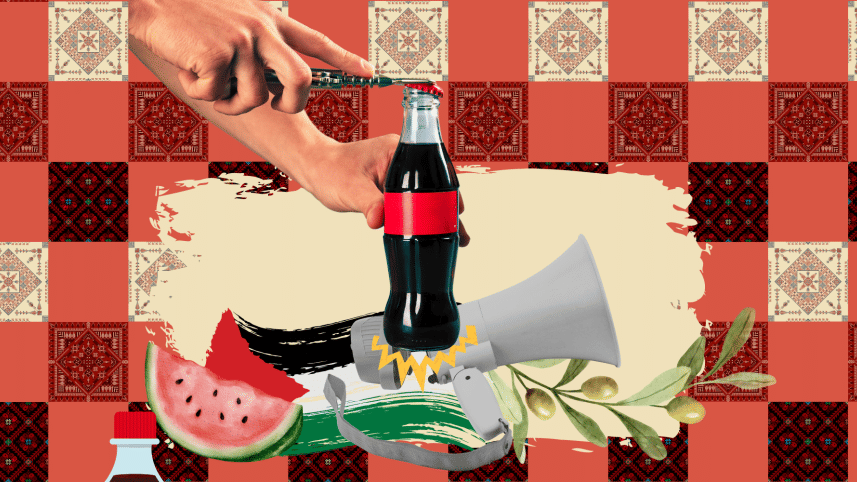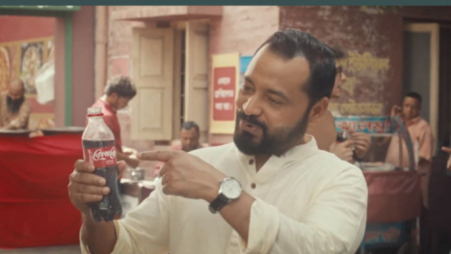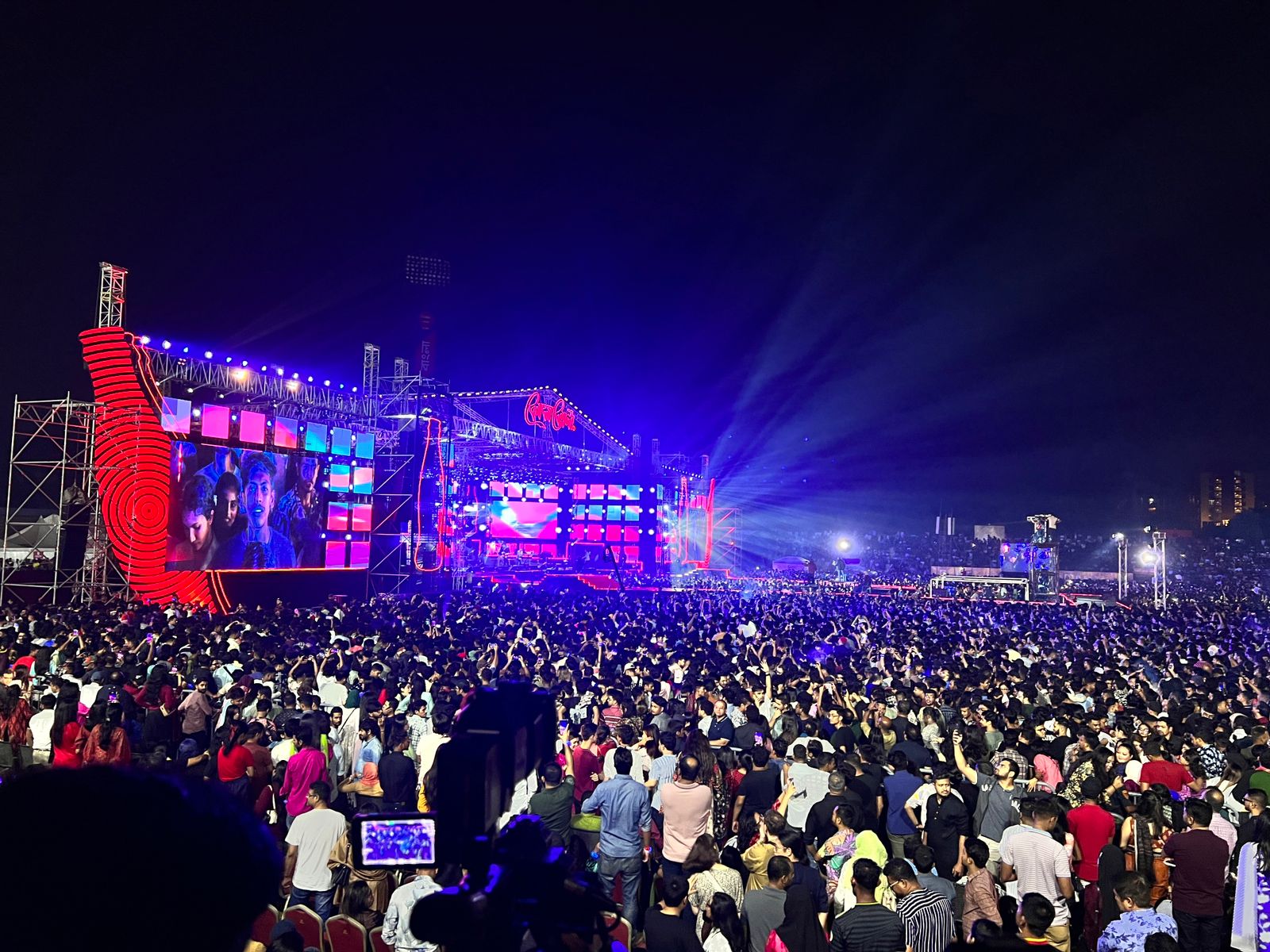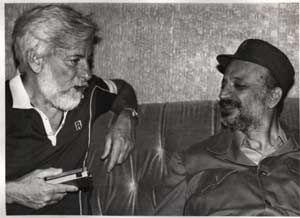'That Coca-Cola ad' only proves the power of boycott

A Coca-Cola Bangladesh ad was launched on June 9, before being hidden from their YouTube channel after severe backlash from the audience on social media, after which it was made public again. Meanwhile, the lead actor featured in the ad, who also directed it, had to issue a statement on social media to defend his stance as a staunch supporter of "humanity" and clarify that his involvement was a strictly "professional" engagement. There have been many criticisms and debates regarding the ad being a PR disaster and the overall effectiveness of the Boycott, Divest and Sanction (BDS) movement globally and in Bangladesh. But why did Coca-Cola feel the need to launch an ad clarifying its stance in the first place?
The BDS movement has caught on in many countries across the world to hold brands accountable for their affiliations with Israel and their complicity in Israel's genocide of Palestinians. Inspired by the South African anti-apartheid movement, the BDS movement was launched by 170 Palestinian unions, refugee networks, women's organisations, professional associations, popular resistance committees and other Palestinian civil society bodies in 2005, as a form of non-violent pressure on Israel to end their illegal occupation of Palestine.
The movement recently caught on again in the aftermath of October 7. Soon, pro-Palestine groups in Bangladesh also spontaneously participated in the boycott movement as best as they could. The effectiveness of the boycott movement in Bangladesh was questioned by many, but the fact that Coca-Cola found it necessary to launch an ad addressing this only goes to show that it has worked.
The overall rhetoric of the ad also demands some scrutiny. It begins with a shopkeeper asking one of his regular customers if he wants a Coca-Cola, to which he replies that he has stopped drinking the beverage because it comes from "that country".
The shopkeeper then goes on a quest to identify the source of the information, which happens to be an unreliable Facebook page. He explains how Coca-Cola has been in the business for 138 years in 190 countries, including Turkey and Spain. A nice spin, considering Turkey is a Muslim-majority state and Spain is one of the four latest European countries to recognise the Palestinian state. However, what Coca-Cola conveniently forgot to mention is that Turkey is also the country whose parliament mandated Coca-Cola be no longer sold in the parliament campus, as part of a boycott of companies that "support Israel."
Then the bomb drops. "They also have factories in Palestine," says the shopkeeper, and convinces the entire neighbourhood to start drinking the beverage again. Everyone is happy, their conscience clear. But clear of what exactly?
Not once do they mention Israel or the ongoing genocide committed by the country on Palestine. They are right when they say that they are an American company with factories in Palestine. The National Beverage Company Coca-Cola (NBC) obtained a franchise licence in 1998 to manufacture, package, and distribute Coca-Cola products in the Palestinian market from a Ramallah factory. The business expanded to supposedly create jobs for many Palestinians and accelerate the state's economy. However, how does this information translate to the current context? What good is a factory if the entire area is bombed, with thousands dead and the rest being starved? Who's going to work there?
We also need to look into Coca-Cola's role in Israel's occupation if we're talking about its operations in Palestine. Coca-Cola has a factory in Atarot, an illegal Israeli settlement built on stolen land on the West Bank. Palestinian communities are forcibly removed for illegal Israeli settlements like this. In 2017, the UN's human rights commissioner sent letters to 150 companies operating in Israel and around the world for operating in the occupied territories in the West Bank and East Jerusalem. The list of the companies included The Central Bottling Company Limited (also known as Coca-Cola Israel).
It is remarkably insensitive and disrespectful on the part of Coca-Cola, still one of the biggest multinational corporations operating in Bangladesh, to take such a condescending tone towards its consumers on this issue. It takes no more than a rudimentary search of the internet to establish the ties between Coca-Cola, the global brand, and the genocidal state of Israel. Defenders of the Coke brand will say that the company functions using franchises and local bottling partners—like Abdul Momen Ltd. in Bangladesh, NBC in Palestine, and The Central Bottling Co. Ltd. in Israel—who have nothing to do with one another. But it is one entity who supplies licences, technical support, financing, and often raw materials to these local partners, and that entity is The Coca-Cola Company that is traded under the ticker symbol "KO" in the New York Stock Exchange. It is asinine to suggest that a company whose business model largely consists of franchising and partnering with local companies for bottling and distribution will not feel the pinch when boycotts across the globe have started to shift consumption patterns, as has been reported in Egypt and even Bangladesh. The global network of Coca-Cola subsidiaries and partners are also linked through business ties, with companies owning shares in a structure that eventually benefits the entirety of the Coca-Cola brand. For example, it was reported in February of this year that the Bangladeshi bottling business of The Coca-Cola Company (TCCC) was being sold to Coke's Turkish associate, Coca-Cola İçecek (CCI). However, TCCC itself owns a 20 percent stake in CCI, making it clear that no Coke business anywhere in the world is done in isolation, and that a boycott in a place like Bangladesh definitely has the power to make waves globally.
The fact that this brand-cleansing attempt of an ad made by Coca-Cola disregards the public's ability to understand these relations and expects people to simply take them at their word diminishes their image in the people's eyes. The timing of this ad, in the lead up to Eid-ul-Azha when cola consumption is at an annual high, is also telling. It can be justifiably argued that Coca-Cola did not make this ad from any moral compulsion, or with the intention of assuring its customers that it is not complicit in genocide. This was an attempt at saving their hide, and a bad one at that.
Then comes the issue of "selective" boycotting. Part of the discourse is also that we should boycott pro-Israel social media platforms, particularly Meta. But on one hand, you have beverages and other products that have multiple local alternatives. On the other hand, you only have a few social media platforms that help you reach millions of people. Yes, there were legitimate allegations of Facebook and Instagram blocking pro-Palestine accounts. But what we also need to consider is that the international media is doing close to nothing to uncover the horrors being unleashed upon the lives of Palestinians. When they choose to report on the genocide, the narrative dehumanises Palestinians and portrays Israel as a "victim" of Hamas. Pro-Palestine voices must push back and reclaim their spaces on social media platforms to get their narrative across.
For sure, Coca-Cola has the right to push back on a boycott of its product. There are livelihoods and a great sum of money attached to this one business. However, they do not have the right to treat their consumer base with condescension, nor do they have the right to mislead the public. The developments of the war in Gaza has been heart-wrenching for Bangladeshis, as we share historical ties with the Palestinian people and their struggle. A global brand trying to tell us that we are immature or ignorant for feeling this way is not acceptable.
Nahaly Nafisa Khan is a journalist and writer.
Views expressed in this article are the author's own.
Follow The Daily Star Opinion on Facebook for the latest opinions, commentaries and analyses by experts and professionals. To contribute your article or letter to The Daily Star Opinion, see our guidelines for submission.




 For all latest news, follow The Daily Star's Google News channel.
For all latest news, follow The Daily Star's Google News channel. 


Comments